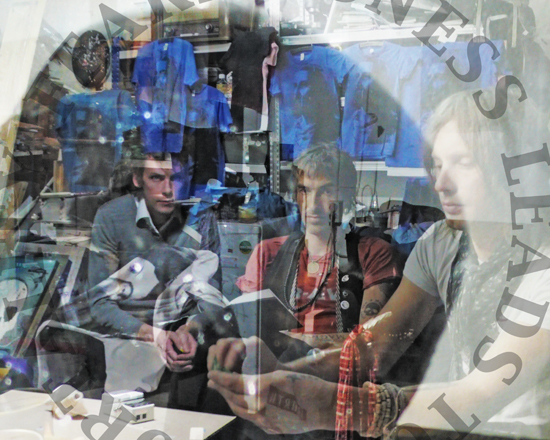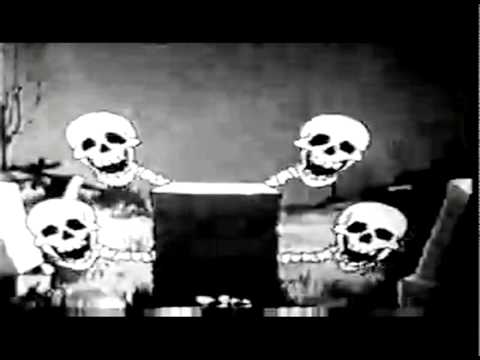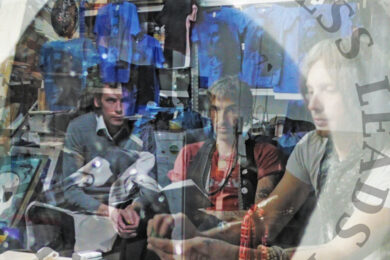Psychedelic rock is often a lazy old thing, made by scruffy herberts with too much time, a surfeit of weed, and a lack of decent hemming on their trousers. This, of course, lessens rock’s transcendental potential to become something more than itself. This is defiantly not the case with Dead Skeletons. The Quietus first became aware of this Iceland-based group a few years back when our film editor David Moats was sent the track ‘Dead Mantra’ by a friend obsessed with the occult. Its euphoric near-nine minutes was, and remains, a Quietus anthem, the wind tunnel guitars, crashing cymbals and refrain of "he who fears death cannot enjoy life" seeing us through the bleak winter of 2010, and many dark times since.
It was, at first, hard to find out anything more about this group beyond videos featuring scurrying figures on YouTube. Alan McGee even thought it was Anton Newcombe’s new band. Then, finally, they released their debut album Dead Magick, a record of transportative far-out guitar hymnals. We finally managed to track down these "monks of the dead temple" and their leader, Nonni Dead, and discovered a remarkable truth: that the dead mantra was more than just a collection of terrific riffs, but a means of living with HIV.
Nonni Dead: The album was never planned. I have never been into music before. I had friends in the music scene, like Henrik Björnsson from Singapore Sling and Anton Newcombe from Brian Jonestown Massacre, but it wasn’t until 2007 when Anton came here to record My Bloody Underground… that was the first time I ever went into the studio to do something.
Did you have any musical ambitions prior to this?
ND: When I was much younger living in Glasgow I was thinking it would be nice to start a band and make music, but I have never learned to play instruments. The first time in the studio was with Anton on the Golden Frost. I went into the studio and did a few words, and then when Brian Jonestown played at Glastonbury I went onstage with them.
How did that become ‘Dead Mantra’ and Dead Skeletons?
ND: With ‘Dead Mantra’, I was doing an installation in the art museum in Reykjavik in 2008, and I wanted to bring the Dead Concept further, to use other kinds of art like music.
I asked Henrik if he could do a Dead Mantra song with the slogan ‘He who fears death cannot enjoy life’. For me it was a spiritual battle song, because I have been HIV positive for 20 years, and the Dead Concept has grown out of that experience, my fear of death. I thought it would be great to do a dead song.
When I put the song on it is like I am going to war, I am beating the virus. I had Hepatitis C and I beat it on my own. For me there is a whole war, a spiritual, nuclear battle inside me. It is the song I want to hear when I go to meet my maker. It tells me not to give up, and to cure myself. It’s my meditation song, and I love rock & roll.
Are you alright to discuss your experience of living with HIV?
ND: The first time I saw the doctor and was diagnosed was 1994, and I had had the virus since 1992. The times were different, they gave me three years. Oops, OK! So I thought ‘fuck it’, started drinking heavily and taking hard drugs like there was no tomorrow. I had to choose whether I wanted to die or live, and I took the decision to live. During that time the medication got better and better, though I could share stories with you about the medication for HIV. I remember one of them I was out of my head for two weeks, I can’t remember that time, it was so strong and terrible.
In 2002 I quit drinking and I started the Dead Concept about a year later, in 2003. I wanted to be an artist, but it was hard to be an artist and make a buck. I opened the Dead Shop where I was printing t-shirts to sell to the public. I had decided to call the concept Dead, most because of the fear I had, and also being dead drunk, because most people knew me like that. It has various sides to it.
Core to the Dead Concept is the repeated image of a skull. Why is that?
ND: I had the skull always as an image. I wanted to use it because we all have one, and I see it as a union, it doesn’t matter what colour you are, or what skin or religious type, we all have the skull. It’s also a reminder of life because the Dead Concept has always been a reminder of life itself, to live your life to the full.
And the mantra itself?
NS: I was in Mineappolis doing an art show. I already had the skull in my mind, and then I was visiting a friend’s house around the Day Of The Dead and saw this question in Spanish, and I asked what it was. My friend said it means ‘he who fears death cannot enjoy life’. It was like, PING! I started meditating on the skull and it really helped. Instead of giving up I just used the fear, and turned the fear around. I started meditating on the fearlessness.
Slowly it built like layers and layers, and I could see the concept building in so many branches. It is like a tree, so the Dead Skeletons is one, Dead TV is one, my silk screen art is one. It’s spreading like a virus, but a benign virus, it actually looks like the computer image of a virus. It is all connected. Art is my life, and my life is my art.

I made an art show with Anton earlier that year when I used one of his songs in the gallery, and I wanted to use one of my own songs for the next one. That is how ‘Dead Mantra’ was born.
How do you put the music together?
ND: I collect a lot of items from Tibet, I have bones and many magical things that I use in the music. I feel that there are certain spiritual energies that go into the music. For me, coming to record sounds and music is something new, so my approach to it is childlike. I don’t know how to play guitar, but I tune it in open tuning and take it further, maybe put a Tibetan singing bowl on it and making sounds. I am not a musician, I am an artist, but I love making sounds.
It is all about my interest on life, and history and spirituality. I always keep my cup empty and go through it and I make my own opinions.
Did you intend to write an album?
ND: we came together and met in the Dead Temple, and then the magic started to happen. Maybe I had some ideas for a beat, or some other kind of internet found sound of a planet, and I laid that over a Tibetan singing bowl, and you start hearing it, you know, what we should do next. It was never hard for us to make a song, we just emptied our minds and the song came alive. There was no obligation or ideas of anything except the sounds coming through us. I think it is very important that I do the music here because there are many objects that are very powerful, spiritually. Through the years I have become more and more spiritual, and that comes out in the music.
This came with the sentence of death, and realising life, and also understanding that life is merely a small chapter in a big book. It’s having no fear of dying, for the soul to evolve and grow is like changing clothes. I see life in thousands and thousands of years, we are not here for this one experience. We have been here for a long time.
Do you take inspiration from many different philosophies?
ND: Yes. All of them. For me it is very simple, one is all and all is one. If you want to call it God, or energy or whatever, it’s truly like you are in it and it is in you. It is very good to simplify it like that. I am in him and he is in me.
Did you have no spiritual belief at any point?
ND: When I was a teenager I believed that there was nothing more than this and when you die, it is all black.
Did the diagnosis change your views?
ND: Yes, and also it takes you a whole life to try and understand everything, but I have been looking into many different… I jump into the pool and I take in Buddhism and Christianity, I look at it from various points. For example, what the Buddhist masters say is you should make your own ideas, make your own Buddhist religion, though it is not a religion. I like the mantras, but who says you can’t do it in your own way?
These are great times we are living in. To be alive today, we should honour it. You choose to live here now. I believe that. We go through life to live as spiritual beings, you choose to come here. Start thinking of it like that, it’s much better.
Dead Skeletons play the Liverpool Festival Of Psychedelia this weekend, before touring the UK including London’s Corsica Studios next Wednesday, October 3rd





